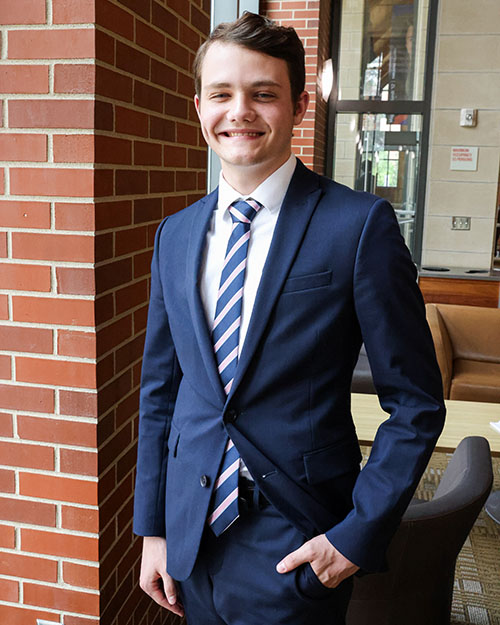 Sophomore Kaden Legore '27 found himself on a quest to learn about a topic that wasn't part of Cornell's regular course offerings. With the help of his professor, he decided to set up a unique 18-day course using the independent study program.
Sophomore Kaden Legore '27 found himself on a quest to learn about a topic that wasn't part of Cornell's regular course offerings. With the help of his professor, he decided to set up a unique 18-day course using the independent study program.
The topic? The Iowa and federal court systems. The time? Block 5. The result? An adventure that merged his belief that the law is something more people should know about with a chance to explore what sort of law he wants to study later in life.
“Independent study works perfectly on the block plan; you can do it for one month, and that’s a good amount of time for you to be on your own,” Legore said. I think it’s an interesting opportunity and it’s really great the college offers it.”
Cornell’s independent study program allows students to do an in-depth study of a topic of their choice with the guidance of a professor. Options for independent work include internships, group projects, and an individual project–like the one Legore created. Students may do this up to four times during their four years at Cornell.
Legore, who is also in Mock Trial and the Pre-Law Honor Society, wanted to get a deeper understanding of the court system by being in person, in the courtroom, and experiencing cases as if he were a member of the legal system.
“My mom is a judge, and I have other people in my family that are lawyers, so I've always felt connected to it.”
The independent project experience introduced him to a lot of aspects of both Iowa and federal law.
Legore planned his 18-day adventure to learn as much as possible during his self-designed block. With the help of Assistant Professor of American Politics Megan Goldberg, he drafted a schedule of court cases he could watch in person, along with a written assignment to pair with each court case. He watched cases at the federal courthouse in Cedar Rapids–just 20 minutes from campus–and traveled to Des Moines to witness oral arguments at the Supreme Court.
At the U.S. District Court’s courthouse in Cedar Rapids, Legore watched a trial with the goal to see the trial, take notes, and write an essay as if he were a newspaper reporter.
Later, Legore went to Des Moines. He read the briefs and watched oral arguments for three cases in front of the Iowa Supreme Court. He also had the opportunity to watch a recording about the state of the judiciary in Iowa.
Afterward, inspired by an assignment from Stoll Program for Law & Society Faculty Director Megan Yaminishi’s introductory Constitutional Law class, he wrote a paper under the premise that he was a judge writing the opinion for the case. A third lawsuit was settled outside of the courtroom.
“It settled the week before trial,” he said. “It was unfortunate, but that's how the world works, so that taught me another thing about the law.”
At the end of the course, he wanted to share what he's experienced with his friends. He invited a group of fellow pre-law students to the federal courthouse to meet with the chief judge for the district.
“It was a very cool culmination and to try and pass that on—I really enjoyed that.”
After learning so much about the state and federal courts, reading briefs, and seeing competent attorneys, he says he's now more interested in a career arguing cases. He hopes to build off of these experiences with future internships, perhaps even at the U.S. Attorney’s office.